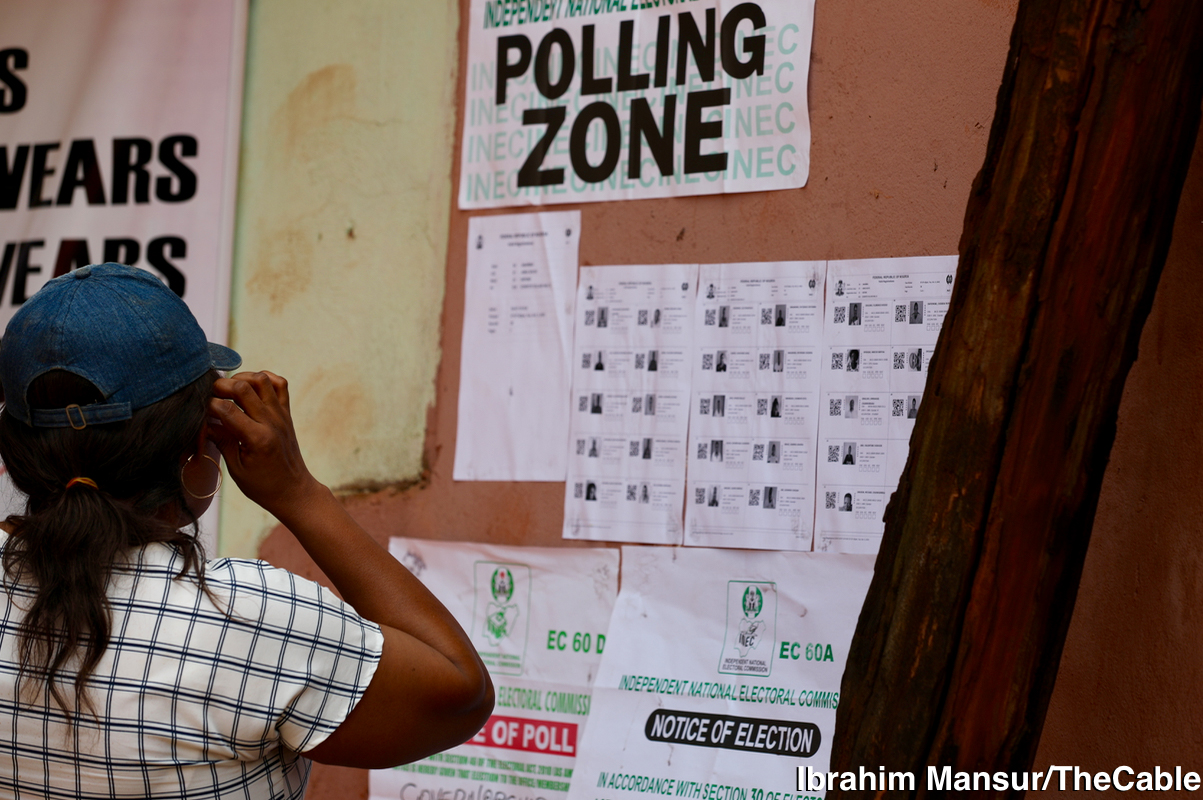A polling unit during the Anambra governorship election in 2021
The elections into the six FCT area councils were held on Saturday, February 12, 2022, and the winners and losers are respectively still savouring and brooding the outcome. From the various reports already in the public domain on the outcomes of the elections, it is clear that we can’t afford to shout uhuru yet over the conduct of elections in Nigeria.
The reverberating joyful noise of President Muhammadu Buhari’s assent to the electoral bill nonetheless, the outcome of Nigeria’s most recent elections on the dusk of which new bill arrived clearly shows that there is an urgent need to rethink, redesign and revolutionise elections administration and management in Nigeria.
The urgent and necessary reforms needed have to focus on the following areas where the FCT elections confirmed that the tradition of business as usual nature in Nigeria’s electoral firmament is still alive and well.
1. Vote selling and buying: Despite the hues and cries on the dangers posed by vote-selling and vote-buying to our democracy and the emergence of quality leadership, many voters are still loving it. The politicians still see money politics as a culture the people can not purge themselves from. There was free naira rain all over Abuja on the eve and on the day of the area council elections.
Advertisement
On the day preceding the elections, agents of PDP and APC, the leading political parties, moved from compound to compound in the villages and urban slums of Abuja sharing N500 and N1,000 to urge the residents to vote for their candidates. Some of the residents who were not at home during the visits said their neighbours called them on phone joyfully urging them to rush back home and grab their shares of the vote purchase windfall. A lady who received the call from her neighbour to hurry back home said: “I felt so bad to see how people around me were jumping up and down excitedly because of only N500 or N1,000 naira inducement from a politician they have only met on the poster and might never see in the course of their tenure which is certain to be fruitless since they have purchased the voters in advance”.
The ease and confidence at which the politicians’ cronies shamefully carry money around during elections clearly showed that the political class has come to the conclusion that the Nigeria masses are foolish people who lack the capacity to think deeply and see how their habit of collecting money to vote in elections has consistently robbed them of quality representation and sustainable development.
Strengthened by this awareness, the agents of many of the candidates from the big parties took enough cash along to the polling centers to share for those who were available to engage in money for vote exchange.
Advertisement
2. INEC is still INEC
The federal capital territory area councils elections offered INEC an uncommon opportunity to demonstrate uncommon capacity and excellence. These are the only local government elections that are conducted by INEC. In the 36 states of the federation, the state electoral bodies conduct elections into the wards and the local governments in their jurisdiction. The FCT election, therefore, offered INEC the opportunity to bring their voters’ education, elections administration, and management performance to A++ level.
The electoral umpire had the opportunity to also demonstrate zero tolerance to vote selling or buying around the polling units. The size and nature of the election holding in the city that houses INEC’s Headquarters demanded that the conduct of the elections should be flawless.
None of these was the case as the reports across the sixty-two wards showed that INEC’s performance was the usual average. The report from YIAGA Africa and other monitors as well as the media reports confirmed this. Going forward, INEC must go back to the drawing board and holistically transform its performance capabilities.
Advertisement
3. Voters’ apathy is still prevalent
The total number of accredited voters for the FCT elections was 1.5 million. The total turnout of voters was less than 10% percent of accredited voters. What this means is that less than 10% of accredited voters elected each of the 6 winning candidates. In any examination, that is a woeful performance.
The worst case of voter apathy in the six area councils was in the Abuja municipal council where the total number of votes received by the winner was less than 20, 000 votes in a local government with a population well in excess of one million people and around 700,000 accredited voters. The total voters’ turnout in AMAC was around 7% of registered voters.
The reason for the abysmally poor voters’ turnout in the FCT’s richest area council was because most AMAC residents don’t feel the presence of that level of government at all. The local government in the Abuja municipality only exists by name and not in actions. The only way they make their presence felt is in their desperate and annoying search for revenue estates and roads where their presence is non-existent.
Advertisement
Many of the residents blamed the lack of any visible action of local government officials for their refusal to come out to vote. Many others said they didn’t bother to come out and vote because the candidates didn’t campaign to their area and they don’t know which of them to vote for.
The signing of the electoral bill is a good thing. However, the bill will not guarantee any significant change in the next rounds of elections and particularly in the 2023 elections if the observable lapses are not painstakingly addressed.
Advertisement
Osho is a development specialist, an author, a pastor, and a technotician. He was the candidate of Abundant Nigeria Renewal Party for senate in the federal capital territory in the 2019 general elections.
Advertisement
Views expressed by contributors are strictly personal and not of TheCable.
Add a comment







